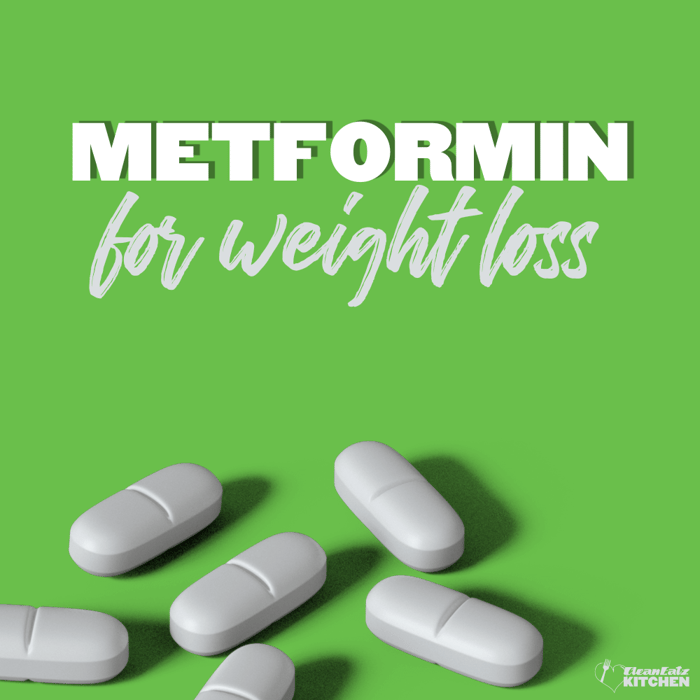Metformin for Weight Loss: Does It Work? (2025 Research & Guide)

Dorothy M. Shirnyl, RND
Weight Loss
|
Healthy Lifestyle
10/10/2025 8:31am
8 minute read
In our pursuit of health and fitness goals, we often encounter trends that gain popularity on social media or through advertising—metformin for weight loss being one of them. While we're always looking for tools to enhance our efforts in the kitchen and gym, it's crucial to approach these trends carefully and research their safety and effectiveness thoroughly before trying them.
Today we'll explore metformin's role in weight management, covering:
- What metformin is and its primary uses
- How metformin aids in weight loss
- Safety profile and side effects
- Who might benefit from metformin for weight management
What Is Metformin And What Is It Used For?
Metformin is a first-line medication for treating type 2 diabetes. It works by reducing the amount of glucose released by the liver into the bloodstream, helping the body's insulin function more effectively, and improving muscle insulin sensitivity. This triple action makes it highly effective for blood sugar control.1
Beyond diabetes treatment, metformin is also prescribed for:
- Preventing type 2 diabetes in high-risk individuals (those who are overweight or have prediabetes)2
- Managing polycystic ovary syndrome (PCOS)
- Treating gestational diabetes
Exciting research continues to emerge about metformin's potential benefits beyond blood sugar control. Studies suggest it may reduce cancer risk in type 2 diabetes patients, lower the risk of dementia and stroke, slow aging processes, and potentially increase lifespan.3 While more research is needed, these findings make metformin an increasingly interesting medication for various health applications.
How Does Metformin Help You Lose Weight?
While the exact mechanism isn't fully understood, recent research has made significant progress in understanding how metformin promotes weight loss. A groundbreaking 2024 study from Stanford Medicine and Harvard Medical School discovered that metformin works through the same pathway as vigorous exercise—by producing an "anti-hunger" molecule called lac-phe.4
Here's what researchers found:
- Appetite suppression: Metformin triggers production of lac-phe in intestinal cells, which reduces hunger throughout the day4
- Reduced caloric intake: Lower hunger levels lead to naturally eating less without feeling deprived
- Improved metabolism: Enhanced insulin sensitivity helps the body process food more efficiently5
- Body composition changes: Studies show reductions in body mass index (BMI), waist circumference, and overall weight6
Research demonstrates that metformin produces modest but clinically significant weight loss. In large-scale studies:2,6,7
- Average weight loss ranges from 2-6% of body weight (approximately 5-12 pounds for most people)
- About one-third of patients lose at least 5% of their body weight within a year
- Weight loss is sustained long-term—studies show benefits lasting up to 15 years with continued use
- Results improve with adherence—the longer people take it consistently, the better the outcomes
Importantly, these positive changes occur even in people without type 2 diabetes.7 The best results are achieved when metformin is combined with lifestyle changes like balanced nutrition (avoiding sugary drinks, eating whole foods, increasing vegetable and protein intake, limiting processed foods) and regular physical activity.
Support Your Weight Loss Goals: Combine metformin with nutritious, portion-controlled meals. Explore our weight loss meal plans designed to help you reach your goals.
Metformin vs. Newer Weight Loss Medications
With the rise of GLP-1 receptor agonists like semaglutide (Ozempic, Wegovy) and tirzepatide (Mounjaro, Zepbound), many people wonder how metformin compares. Here's what the research shows:8,9
Weight Loss Comparison:
- Metformin: Average weight loss of 5-6 pounds (2-6% of body weight)
- Semaglutide: Average weight loss of 8-15 pounds (8-15% of body weight)
- Tirzepatide: Average weight loss of 15-20% of body weight
Key Advantages of Metformin:
- Oral medication (no injections required)
- Significantly lower cost
- 60+ years of proven safety data1
- Can be used in combination with GLP-1 medications10
- Long-term effectiveness demonstrated over 15 years2
- Widely available and covered by most insurance plans
Many healthcare providers now prescribe metformin alongside newer medications, leveraging the complementary benefits of both approaches for optimal weight management and metabolic health.10
Safety and Side Effects of Metformin
Metformin has an excellent safety profile, which is why it's been the first-line diabetes medication for decades. However, like all medications, it can have side effects.
Common Side Effects
The most frequently reported side effects are gastrointestinal and typically occur when first starting the medication:
- Nausea and stomach discomfort
- Diarrhea
- Bloating
These symptoms usually diminish over time. Extended-release formulations and slow dose titration can help minimize these effects.
Rare but Serious Side Effects
While uncommon, more serious side effects can occur:
- Lactic acidosis: A rare but potentially serious condition, particularly in people with significant kidney disease or diminished renal function11
- Vitamin B12 deficiency: Long-term use may reduce B12 absorption—regular monitoring and supplementation can address this
- Low blood sugar: Risk increases when combined with insulin or other diabetes medications
Dosage Guidelines
Standard dosing ranges from 500-1000 mg once daily, with a maximum dose of 2000 mg per day.11 Healthcare providers typically start with a low dose and gradually increase it to minimize side effects. Extended-release formulations taken once daily offer improved tolerability for many patients.
Important: These dosages are for informational purposes only and not a prescription. Always consult with a qualified healthcare provider before starting metformin or any medication.
Who Might Benefit from Metformin for Weight Loss?
Based on current research and clinical guidelines, metformin for weight management is most appropriate for individuals who have:12
- Prediabetes: Metformin is FDA-approved for diabetes prevention in high-risk individuals
- Type 2 diabetes: Weight loss can significantly improve disease management
- Obesity with insulin resistance: Metformin helps the body use insulin more effectively
- PCOS: Weight loss can improve symptoms and hormone balance
- Severe obesity (BMI ≥ 35): Modest weight loss can have significant health benefits
- Weight gain from antipsychotic medications: Metformin may help prevent or reverse this side effect
Metformin is increasingly prescribed off-label for weight management in people without diabetes but with obesity or overweight plus metabolic risk factors. However, it should be viewed as a long-term adjunct therapy rather than a quick fix.12
Final Thoughts
Metformin is a well-established medication with proven benefits for weight management and metabolic health. With 60 years of clinical use and extensive safety data, it offers a reliable option for people struggling with weight, especially those with prediabetes, diabetes, PCOS, or insulin resistance.
The 2024 discovery that metformin works through the same "anti-hunger" pathway as vigorous exercise provides fascinating insight into its mechanism and validates its use for weight management. While newer medications like semaglutide may produce greater weight loss, metformin's advantages—oral administration, low cost, proven safety, and sustained long-term effectiveness—make it an attractive option for many people.
Remember: there is no magic pill for weight loss. The most successful outcomes occur when metformin is combined with sustainable lifestyle changes including balanced nutrition, regular physical activity, adequate sleep, and stress management. If you're considering metformin for weight loss or metabolic health, consult with your healthcare provider to determine if it's appropriate for your individual situation.
Ready to Take Control of Your Nutrition? Explore our chef-prepared, portion-controlled meals designed to support your health goals.
Frequently Asked Questions
Is metformin gluten-free?
Metformin itself does not contain gluten. However, some brands may use inactive ingredients that could potentially contain gluten. Check with the specific manufacturer or consult your pharmacist to ensure your metformin is gluten-free.
When should I take metformin for weight loss?
Metformin is typically taken with meals to minimize gastrointestinal side effects. Extended-release formulations are usually taken once daily with dinner. Follow your healthcare provider's specific instructions regarding timing and dosage.
Will metformin make me gain weight?
No, metformin is not associated with weight gain. It's known for its weight-neutral or weight-reducing effects, particularly in people with conditions like diabetes, obesity, or PCOS. Individual responses can vary, so discuss any weight concerns with your doctor.
Is metformin a pill or insulin?
Metformin is an oral medication (pill) that belongs to the biguanide class of drugs. It is not insulin. Metformin works by reducing glucose production in the liver and improving insulin sensitivity, while insulin is a hormone administered via injection or pump to directly lower blood sugar levels.
How long does it take for metformin to work for weight loss?
Most people begin to see weight loss effects within 2-3 months of starting metformin, though some notice changes sooner. The weight loss is typically gradual and steady. Research shows that staying on metformin consistently produces the best long-term results.2
Can I take metformin with other weight loss medications?
Yes, metformin can be safely combined with many other weight loss medications, including GLP-1 receptor agonists like semaglutide. Many healthcare providers prescribe combination therapy for enhanced results.10 Always consult your doctor before combining medications.
References
- Bailey CJ. Metformin: historical overview. Diabetologia. 2017;60(9):1566-1576.
- Diabetes Prevention Program Research Group. Long-term effects of metformin on diabetes prevention. Diabetes Care. 2019;42(4):601-608. View study
- Yerevanian A, Soukas AA. Metformin: Mechanisms in Human Obesity and Weight Loss. Current Obesity Reports. 2019;8(2):156-164. View study
- Stanford Medicine. Weight loss caused by common diabetes drug tied to "anti-hunger" molecule in study. March 18, 2024. View article
- Haber R, et al. The impact of metformin on weight and metabolic parameters in patients with obesity: A systematic review and meta-analysis. Diabetes, Obesity and Metabolism. 2024;26(5):1850-1867. View study
- Effectiveness of metformin on weight loss in non-diabetic individuals with obesity. PubMed. 2012. View study
- Metformin-induced weight loss in patients with or without type 2 diabetes/prediabetes: A retrospective cohort study. Obesity Research & Clinical Practice. 2020. View study
- Ozempic vs. Metformin: What's the difference? Medical News Today. March 2025. View article
- 8 Major Differences Between Ozempic and Metformin. GoodRx. July 2023. View article
- Efficacy and safety of semaglutide combined with metformin in treating T2DM with overweight or obesity. PMC. 2024. View study
- Springer Link. Safe dosages of metformin. 2011. View study
- Pantalone KM. Should I consider metformin therapy for weight loss in patients with obesity but without diabetes? Cleveland Clinic Journal of Medicine. September 2023. View article



